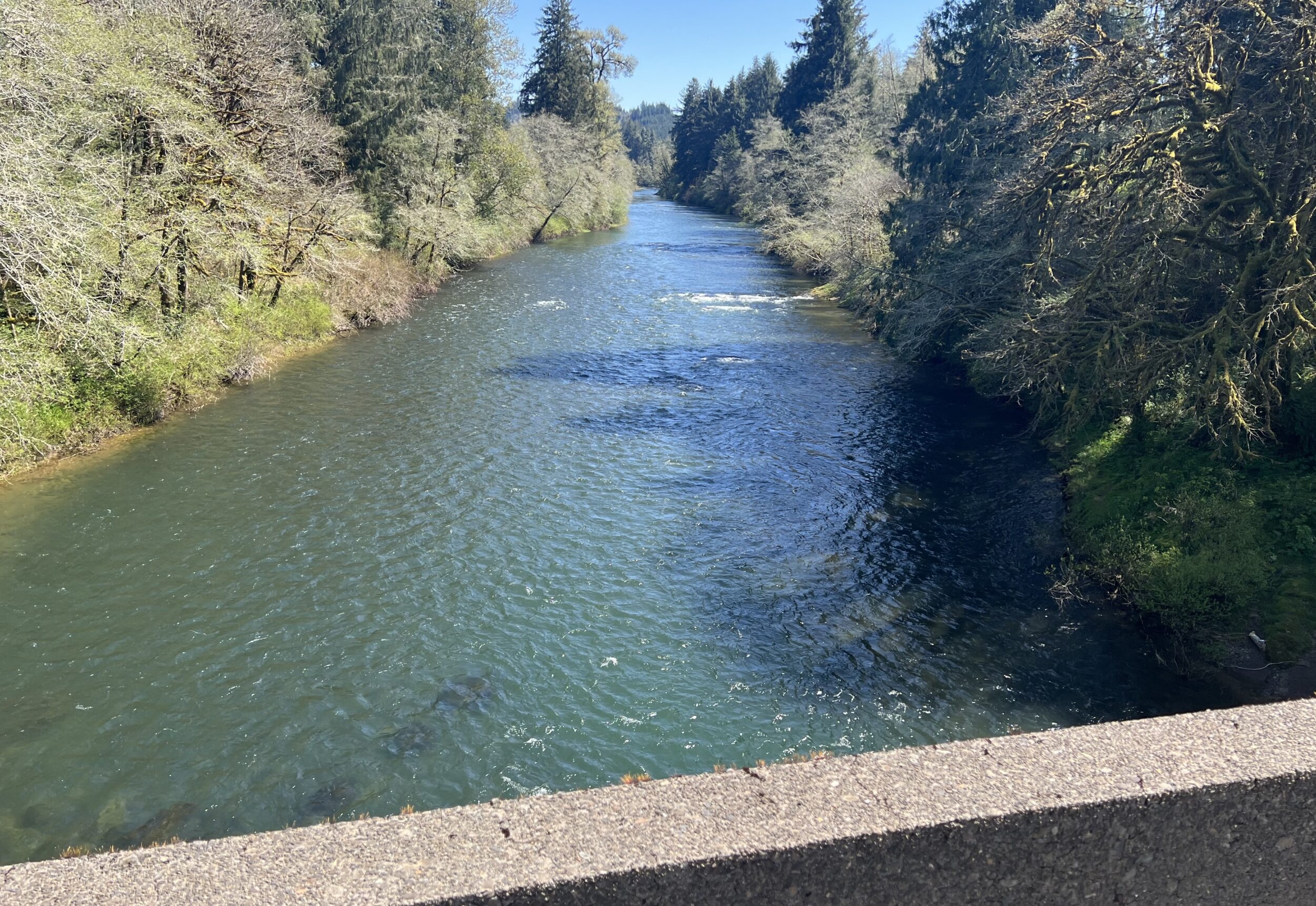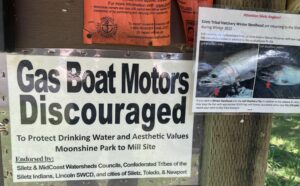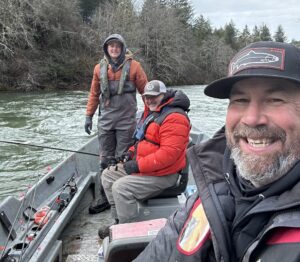
By QUINTON SMITH/Lincoln Chronicle
Fishermen, boaters, and environmentalists are battling over a request by the Siletz Tribe to ban boat motors on a vast stretch of the Siletz River – an issue that the Oregon Marine Board will wade into Thursday.
The issue of banning motor on the Siletz is not new – the so-called “jet pump” motors were prohibited above Jack Morgan Park at river mile 26 starting in 1987. The marine board considered proposals to end all motor use in 2001, 2008 and 2013, but rejected them.
On Thursday the board – five citizens appointed by the governor and confirmed by the Legislature – will take up the issue again during its quarterly meeting in Salem. It has at least three choices: reject the tribe’s request outright, bring the various parties together to see if there could be a compromise of some sort, or begin a 6- to 9-month process to craft rules banning boats with motors above Jack Morgan Park.
“Everything’s an option,” Alan Hanson, the board’s policy and environmental program manager, told the Lincoln Chronicle.

The Confederated Tribe of Siletz Indians submitted a two-page request to the board in February seeking the motor ban. The letter pointed out that the river is located within its ancestral lands and original Coast/Siletz Reservation, and that its request “is in keeping with our mission to care for, protect, enhance and provide for the wise use of all the Tribe’s natural resources in a manner which will ensure that all generations to come will benefit from these resources.”
In its request, the tribe claimed banning motors in the approximately 22 miles of river above Jack Morgan Park would reduce bank erosion, decrease sedimentation and improve water quality, minimize impacts to salmon spawning habitat and eggs, improve safety for non-motorized craft, alleviate an unfair fishing advantage by guides and fishermen who use motors, and ease heavy boat traffic.
The tribe’s request immediately touched off a debate among fishermen – both for and against — and drew the support of a handful of environmental and conservation groups involved with the river, and from Lincoln County. The Oregon Fish & Wildlife Department, which has no control over river use but has longstanding salmon and steelhead programs on the Siletz, is not taking a side in the issue.
Coastal restrictions common
Many of Oregon’s coastal streams, especially those in the heavily fished northwest part of the state have some limits on boat motors or type of motors. The marine board has prohibited all motors on the Nestucca River, for example, but allows electric motors on upper portions of the Trask, Wilson and Kiltches rivers in the Tillamook area. Jet-pump motors are banned above tidewater on the Alsea River, but otherwise motors are allowed there — but little used because of the size of the stream.

Along the Siletz, there are signs at parks and boat ramps that discourage the use of gas motors and encourage electric ones, which are growing more popular and powerful. The signs are endorsed by the Siletz and Midcoast watershed councils, the Siletz Tribe, the Lincoln Soil and Water Conservation District and the cities of Siletz, Toledo and Newport, which get some or all or some of their drinking water from the river.
Like many coastal streams, the Siletz River has seen some of its salmon and steelhead catches rise and fall for a variety of factors the past 20 years.
The catch of fall Chinook last year – 4,024 – in the Siletz River and bay was nearly double that of just four years earlier, according to ODFW records, and is concentrated in September and October. Coho numbers are less than a third of that.
But ODFW regional biologist John Spangler says winter and summer steelhead in the Siletz system are struggling – with 1,285 caught in 2024. Winter steelhead are caught February through April in the lower river and summer steelhead during the summer months high in the Siletz system by bank fishermen.
Lots of comments, opinions
The marine board has been accepting comments on the tribe’s request since March. As of Thursday, there were 63 letters or emails opposing the proposed ban and 50 in favor.
The comments on whether to ban motors follow several themes:
- Supported by all but one tribal members who submitted comments, saying the motor ban is needed to help protect the river and its returning fish;
- Opposition by most, but not all, commercial river guides who say small motors on drift boats allow greater access to more of the river, that conflicts between users are rare and that the tribe’s concerns about bank erosion, water quality and a motor’s effect on spawning fish are misplaced; and
- Support by other fishermen, river users and adjacent landowners who say the proliferation of motorized boats as ruined the quality of the river experience during fishing seasons.

Scott Amerman of Monmouth has guided on the Siletz for 36 years and is head of the Siletz Anglers Association, which works to improve access to the river, helps with the tribe’s and ODFW’s steelhead broodstock program and advocates for more hatchery smolts to be released in the river.
He believes banning motors in the middle Siletz will result in fishermen in drift boats racing downriver to fishing holes and not moving off them for hours, instead of working through them, allowing others to follow, and then motoring back upstream.
“If you take away motors you’re going to create all kinds of conflict,” Amerman says. “I honestly don’t think it’s a fishing issue, but an attempt to limit guides.”
Amerman says the Siletz Anglers Association has been unsuccessful in trying to meet with tribal representatives to discuss issues and see if there are ways to alleviate concerns or problems.
“That’s my hope – to sit down with the tribe and work together,” he said. “We see the future of the river working with the Siletz Tribe. We don’t want to damage that.”
Representatives of the Siletz Tribe did not respond to the Chronicle’s requests for comment.
But the 50 people who sent in letters or emails in support of the proposed ban mostly said the increased use of motors on drift boats has ruined the fishing experience during peak salmon months.
“As a 12-year fishing guide and a 20-year angler of the Siletz, I have watched firsthand as the style of recreational use has shifted,” wrote guide Nolan Davis of Corvallis. “The fish don’t stand a chance. Dozens of motorized drift boats with three or four anglers repeatedly drifting high percentage fish holding areas. Lap after lap, day after day.
“There are times and locations where the use of motors are warranted,” Davis said. “Large rivers, tidewater, lakes, bays and the ocean. The Siletz River or any small coastal river are not it.”
Several people who commented suggested compromises, including allowing only electric motors, or prohibiting motor use certain times of year, or when the river is at low levels, or on certain stretches of the Siletz upriver from Jack Morgan Park.
Hanson, the marine board staffer who will outline the petition and issues to the board on Thursday, agrees the Siletz issues are complex given the heavy use in very specific months, the tribe’s relationship to the river, and other strains on the system.
“This one is a complicated one,” Hanson said. The result may be to set up a rules advisory committee, he said, “to try to come to an agreed upon decision” that will satisfy all of the competing interests.
- Quinton Smith is the editor of Lincoln Chronicle, formerly YachatsNews.com and can be reached at YachatsNews@gmail.com
To read the Siletz Tribe’s request to ban motors on the Siletz River, go here
To read comments on the proposed motor ban on the Siletz River, go here
To watch remotely the Oregon Marine Board’s meeting Thursday, go here



Given the history of forced relocation and what was essentially genocide against Native Americans nationwide and in Oregon, and given this particular confederation’s record of charitable donations throughout Lincoln County, any reasonable request from the Siletz tribes should be granted, and this one seems completely reasonable.
This would be good on the Alsea above Eckman Lake as well.